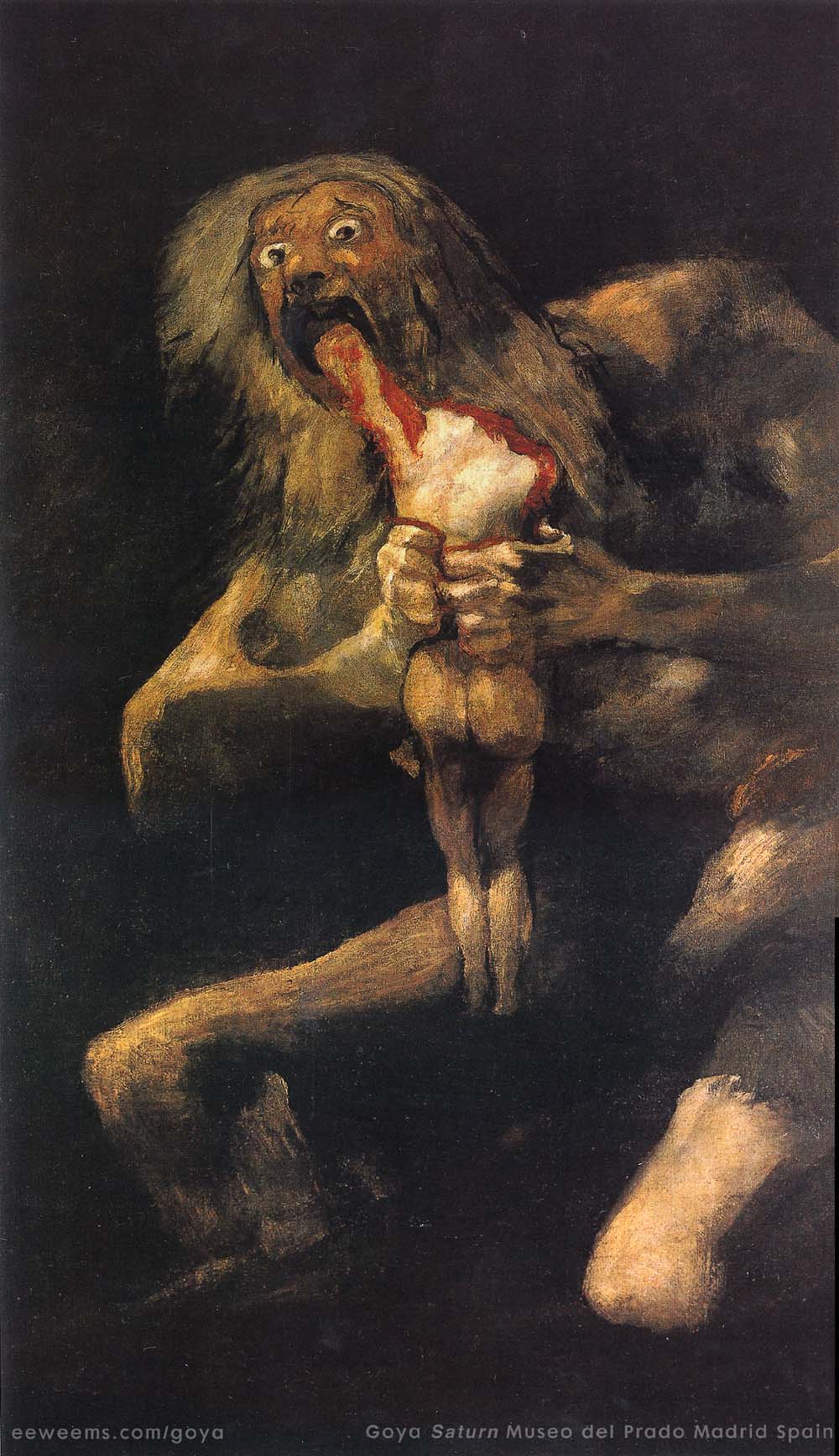The ancient Greeks had two words for time. The first was chronos, which we still use in words like chronological and anachronism. It refers to clock time – time that can be measured – seconds, minutes, hours, years.
Kronos (Roman – Saturnus) the God who devoured his own children (Poseidon representing the sea, Demeter the earth, Hera the air, and Hestia heavenly fire) symbolised the destructive ravages of time, which consumed all. As the King of the Golden Age, and of the Islands of the Blessed, he represented the passing of the ages.
Kronos is depicted as a weary, bent-backed old man with a long grey beard, carrying a scythe and an hourglass. His resemblance to the Grim Reaper is not accidental. Chronos, or Saturn to the Romans, is the being that kills you. It takes away everything you have and then it eats you too. Much like time, which consumes everything.

Where chronos is quantitative, kairos is qualitative. It measures moments, not seconds. Further, it refers to the right moment, the opportune moment. The perfect moment. The world takes a breath, and in the pause before it exhales, fates can be changed. Kairos, even though the Greek meanings are complex and culturally dependent, refers to the right time, opportune time or seasonable time. It cannot be measured. It is the perfect time, the qualitative time, the perfect moment, the “now.”
Kairos is the right moment of opportunity which requires proactivity to achieve success. It is significant and decisive. These moments transcend kronos, stirring emotions and realities to cause decisive action. It is not an understatement to say that kairos moments alter destiny. To miscalculate kronos is inconvenient. To miscalculate kairos is lamentable.

Kairos, is depicted as a young man, lithe and handsome. Statues of him could be found all across the Greek peninsula. Under the statue is carved the following epigram:
And who are you? Time who subdues all things.
Why do you stand on tip-toe? I am ever running.
And why do you have a pair of wings on your feet? I fly with the wind.
And why do you hold a razor in your right hand? As a sign to men that I am sharper than any sharp edge.
And why does your hair hang over your face? For him who meets me to take me by the forelock.
And why, in Heaven’s name, is the back of your head bald? Because none whom I have once raced by on my winged feet will now, though he wishes it sore, take hold of me from behind.
Why did the artist fashion you? For your sake, stranger, and he set me up in the porch as a lesson.
The wings on his feet, suggest his swiftness, borne by the seasons, he goes rolling on through all eternity. His youthful beauty, that beauty is always opportune and Kairos (Opportunity) is the only artificer of beauty, whereas things whose beauty has withered have no part in the nature of Kairos (Opportunity). The lock of hair on his forehead indicates that while he is easy to catch as he approaches, yet, when he has passed by, the moment of action has likewise expired, and that, if opportunity (kairos) is neglected, it cannot be recovered.
The Ancient Greeks, the seedbed of existential thinkers, sought to understand kairos at multiple levels. They applied kairos thinking in arenas of legal, political, and epideitic (the artfully skilled and heightened rhetorical expression of praise). In legal rhetoric, kairos was related to justice beyond the written law, that is, law applied at specific times and circumstances unforeseen by legislators. Political rhetoric concerns the elements of usefulness, suitability, and honor. Kairos was also central to the Sophists, who saw kairos as the ability to understand the subtleties of a rhetorical situation. Kairos is seen as the orator’s ability to adapt to and take advantage of the contingent circumstances.
The New Testament writers reflect the evolution of the word by referring to kairos time as the present moment, the defining moment, and even the God-ordained moments. Kairos is the time-frame for divine interaction and occurrences.
Ancient Indians had the same divided notions of time: chronological and kairotic. And like the Greeks, they mistrusted Chronos. The Sanskrit equivalent of chronos is kala, from which the destructive goddess Kali takes her name.The image of her dancing on corpses with a belt of skulls and severed hands reminds one of the destructive nature of time.
Bibliography
http://www.theoi.com/Titan/TitanKronos.html
http://mckinleyvalentine.com/kairos/
http://growinghealthypassion.com/kairos.pdf

